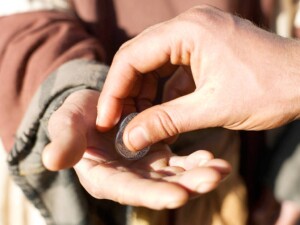Closing Racial Divide – Encounters from Scripture
A planned stop in an unlikely place.
Jesus came to bring an end to racial divide. One day, He was heading to Galilee from Judea, and told His disciples they were going through Samaria. His disciples were aghast! Jews did not travel through Samaria. This land was tainted with half-breeds, the likes of which they did not mingle. Jews did not allow Samaritans to worship with them, and the two groups did not talk to each other. Talk about segregation!
Ah, but Jesus came to bring together the separation among people and nations. He came to unite the racial divide caused by the curse. That’s why He went through Samaria. There was a person He wanted to meet. Instead of sending someone to bring her to Him, He went to her. He met her on her turf and used an every day experience to speak truth to her, giving her eternal life.
The Samaritans
Samaritans were “the descendants of Israelites intermarried with foreigners in the old northern kingdom that fell in 722 BCE.”1
Jews who returned to their homeland after the Babylonian Exile would not accept the help of the dwellers of the land, who were later identified as the Samaritans, in the building of the Second Temple of Jerusalem.2
For over 700 years, there was conflict between the Jews and the Samaritans because one group refused to consider the other of equal worth. Talk about a racial divide! Jews did not travel through Samaria, but that day, Jesus did.
 The sinful woman at the well
The sinful woman at the well
There was a woman He wanted to meet. Not just any woman, mind you, but a woman with a reputation so bad that she came to the well to draw water in the heat of the day. This woman wanted to avoid the stares and talk of other women at the well earlier in the day.
While Jesus sat by Jacob’s well and waited, the woman showed up, as He knew she would. He asked her for a drink. She was shocked that He, a Jew, would ask something of her, a Samaritan. She as much as said so.
The Samaritan woman said to him, “How is it that you, a Jew, ask for a drink from me, a woman of Samaria? (For Jews have no dealings with Samaritans.) John 4:9
Jesus knew everything about this woman. He used the conversation to get to the point He wanted to make with her. She got the point and became a changed person. Because of her testimony, many people believed on Jesus the Christ. You can read the story here.
The place Jesus stopped made a difference in the life of this woman. His disciples learned about true mission as they watched His interaction with her. The willingness of Jesus to enter her world changed her life, forever.
 A good neighbor
A good neighbor
Jesus told stories to make a point. One day he answered the question of a lawyer with a story about a good Samaritan.
He told a parable about a certain man who traveled from Jerusalem to Jericho. On his way there, he was robbed, stripped, beaten, and left for dead. Lying by the side of a well-traveled road, he was too ill to call for help.
A priest and a Levite both came upon the injured man, but they went on their way. Perhaps they didn’t want to get dirty. Maybe they didn’t think they had time or didn’t want to spend the money necessary to restore this bleeding man. Whatever their reasons, they walked right on by.
 The Samaritan
The Samaritan
A Samaritan came along. He went to the man, bandaged his wounds, put him on his own animal, and took him to an Inn. The unfavored Samaritan paid the innkeeper to care for this unknown stranger. He also assured the innkeeper he would repay him for any additional expenses.
What strikes me about this story is that this Samaritan, like the priest and Levite, had places he needed to be and responsibilities to fulfill. This man could also have gone on his way because he had things to do, places to go, and people to see. He didn’t. Instead, he crossed that racial divide. While he didn’t spend days at the Inn to care for the man, he provided for his stay and basically hired the innkeeper to take care of him.
As the lowest of the low, the Samaritan could have said, “Not my people; not my race.” He could have said, “Not my problem; not my worry,” but he didn’t.
He stopped and took the time to meet a need that anybody else could have met. He was willing to cross the racial divide to bring healing and life to an unknown man.
What God wants from me
These stories show me a plan to help end division of any kind. Whether it is family conflict, community tension, or racial divide, there is a plan and there is hope.
- Jesus is Savior to all – every tongue, race, color, and creed. Live it.
- Recognize when your thoughts are prejudicial – and ask God to clean up your thoughts so you can change. The disciples had to do that when they came back to the well and found that woman talking to Jesus.
- Meet the person on their turf, where they are most comfortable. That’s why Jesus went to the well.
- Speak their language and use words that are part of their vocabulary instead of yours. Jesus did this at the well with the women of Samaria.
- Ask them to share their experiences instead of assuming and accusing without hearing their heart. The woman told Jesus about herself by responding to His statements.
- Give truth and the gospel in a culture and language they can understand and with which they can identify. Jesus did that.
- Jesus calls us to serve – and that means giving our time, our energy, our talents, and our resources. If we are too busy or just don’t have time, then we’re really not interested in narrowing the racial divide. The Samaritan modeled this.
- Model reconciliation by meeting others where they are; don’t expect them to come to you. This happened at the well and on the road to Jericho.
- Develop relationships with people who are different from you. When there is a face to a name, it changes our perspective and helps us champion a cause. Look at these two stories and see how this happened!
Jesus used a bunch of uneducated, untrained, and unacquainted – but willing – men to turn the world upside down. He wants to use us to help close the gap in our world. We need only to be willing.

Footnotes:
1 https://www.britannica.com/topic/biblical-literature/The-divisions-of-the-TaNaKh#ref597308
2 https://www.britannica.com/topic/Samaritan
Photo credits:
All photos used with permission from Free Bible Images.







